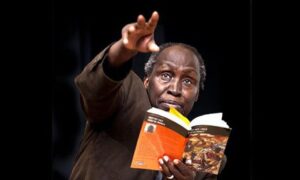
Ngũgĩ wa Thiong’o:
A Titan Among Us: Honoring Ngũgĩ wa Thiong’o
In the vast and vibrant landscape of global literature, few names resonate with the power, conviction, and enduring influence of Ngũgĩ wa Thiong’o. As a Kenyan writer, academic, and activist, Ngũgĩ has not merely penned stories; he has ignited movements, challenged colonial legacies, and tirelessly advocated for the liberation of African languages and cultures. Today, we pay tribute to this extraordinary figure, a true titan whose work continues to inspire, provoke, and illuminate.
Born in 1938 in Kamiriithu, Kenya, Ngũgĩ came of age amidst the throes of colonialism and the fervent struggle for independence. This formative experience profoundly shaped his literary trajectory, imbuing his early works with a powerful sense of political urgency and a deep empathy for the plight of his people. From his groundbreaking novel Weep Not, Child (1964), which poignantly depicts the Mau Mau uprising, to the searing critiques of post-colonial disillusionment in A Grain of Wheat (1967) and Petals of Blood (1977), Ngũgĩ’s early English-language novels cemented his reputation as a fearless voice against oppression.
However, it was his pivotal decision in the late 1970s to abandon writing in English and embrace Gikuyu, his mother tongue, that truly marked a revolutionary turning point. This was not merely a linguistic shift; it was a profound act of decolonization. Ngũgĩ argued passionately that writing in African languages was essential for reclaiming cultural identity, fostering indigenous knowledge systems, and truly connecting with the masses. His subsequent Gikuyu works, such as the powerful novel Caitaani Mũtharaba-inĩ (published in English as Devil on the Cross) and the play Ngaahika Ndeenda (I Will Marry When I Want), written in collaboration with Micere Githae Mugo, became potent vehicles for social commentary and popular mobilization.
This commitment came at a steep personal cost. Ngaahika Ndeenda, performed in a communal open-air theater, was deemed subversive by the Kenyan government, leading to Ngũgĩ’s detention without trial in 1977. His time in prison, where he famously wrote Devil on the Cross on toilet paper, only strengthened his resolve. Upon his release, facing continued persecution, Ngũgĩ was forced into exile, a period that has lasted for decades but has never silenced his voice.
In exile, Ngũgĩ has continued to be a prolific and influential scholar, author, and public intellectual. His theoretical works, such as Decolonising the Mind: The Politics of Language in African Literature (1986), have become foundational texts in postcolonial studies, challenging the linguistic and cultural hegemony of the West and advocating for a polycentric world literature. His memoirs, including Dreams in a Time of War and In the House of the Interpreter, offer poignant reflections on his life and the historical forces that shaped him.
Today, Ngũgĩ wa Thiong’o stands as a living testament to the power of literature as a force for social change. He has inspired generations of writers, scholars, and activists to embrace their linguistic heritage, to challenge oppressive systems, and to tell their own stories on their own terms. His unwavering commitment to justice, his intellectual rigor, and his profound love for African cultures make him an enduring beacon of hope and resistance.
As we celebrate Ngũgĩ wa Thiong’o, we are reminded that true liberation begins in the mind and in the heart, and that the stories we tell, and the languages we tell them in, hold the key to our collective future. Thank you, Ngũgĩ, for your immense contributions, for your courage, and for being a true voice of Africa and of humanity.

No responses yet